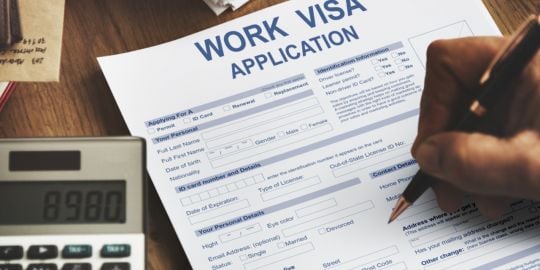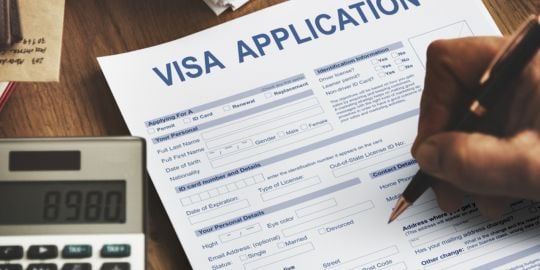The Working Holiday Visa for Brazil

In this article, we will give you all the information you need to organize your Working Holiday Visa trip to Brazil. There are many reasons why Brazil is one of the most popular destinations for holidaymakers — with its diverse landscapes ranging from rainforests to legendary sunny beaches, its rich and colorful culture and its joyful people. It's easy to see why this South American country is such a dream.
But in such a vast country, how do you manage to see it all and immerse yourself in the culture with the locals while still having enough time and budget to finance your holiday there? Well, if your dream is to take a photo with open arms in front of the Christ the Redeemer statue, climb Sugarloaf, or dance in Rio's carnival and still work to finance your holiday, the Working Holiday Visa (or working holiday permit) could be the solution for you.
Conditions to be met for obtaining a Working Holiday Visa for Brazil?
1. Your nationality
Unfortunately, only two countries have been able to establish WHV agreements with Brazil at the moment. These are France and New Zealand.
2. Your age
Only French and New Zealand nationals between the ages of 18 and 30 will be considered for a "Visto de Férias-Trabalho". You must therefore be less than 31 years old at the time of application for the WHV visa in Brazil.
Good to know:
Applying for a WHV visa in Brazil is only for you. The Brazilian government will not allow you to come with dependents (for example, your parents or children).
3. Having a valid passport
To obtain this visa, it is essential that you have a French or New Zealand passport and that it is still valid! It is also important that your passport is valid for at least one year, as a WHV visa in Brazil is valid for 12 months from the time it is issued.
You are, therefore, advised to have a passport that will still be legal and valid when you leave Brazil. Your passport should also have a minimum of two blank pages.
4. Having sufficient funds
Although this visa allows you to work while in Brazil, you will need to prove that you have enough money to cover all your needs when you arrive in Brazil, plus the means to book a plane ticket home by providing evidence of your financial resources. A return ticket to Brazil costs around €800 to €1,200.
The minimum amount the Brazilian government requires from people applying for a WHV visa is 2,500 euros. Regarding airfare, you will have the choice of:
Submitting your reservation for an outward and return ticket
or
Presenting your reservation for a single ticket as well as proof of more resources (in addition to the 2,500 euros) to prove that you will be able to purchase a ticket for your return.
Good to know:
There is no fee for the WHV Brazil visa application process — all the paperwork is free of charge.
5. Participating for the first time
If you have already been granted a WHV for Brazil, you will not be allowed to apply for it a second time, even if you have two of the two nationalities accepted. However, if you have already done a WHV in another country (e.g., Japan, Canada, or New Zealand), you don't have to worry. You can even apply for a WHV in any country you wish to visit.
6. Having a medical insurance policy
Illnesses and accidents happen without warning. You are therefore advised not to neglect the importance of good health and travel insurance before going to any other country. For the WHV in Brazil, it is essential that you take out insurance that, for the entire duration of your stay, will cover:
- Ambulance costs
- The cost of hospitalization
- The cost of any treatment you may need
- Repatriation costs
- Disability
- Possible maternity.
You will need to provide proof of insurance at both stages of the WHV visa application. You will be able to choose the start date of your insurance when you apply, but make sure to choose the date of your departure.
Good to know:
The duration you choose when negotiating your insurance will affect your WHV.
7. Getting a place for the WHV program
Keep in mind that applying for a WHV in Brazil does not automatically mean that you will be accepted. Indeed, only 500 places are open per year for France and 300 for New Zealand. Although these quotas were not met when the Brazil WHV agreement came into force, this destination has, over the years, become one of the most popular on the list of countries participating in this program. So nothing will be guaranteed until you receive the green light.
Good to know:
Quotas are reset every year on January 1st.
How to apply for a Working Holiday Visa to Brazil?
To start the application process, you will need to go in person to the Brazilian embassy in your country to submit your application. For this application, you will need to bring the following documents:
- A WHV application form completed online (on the official Brazilian website)
- A passport valid for a minimum of one year
- A full birth certificate (your parents' full names must be included)
- A passport photo
- A clean police record (not older than three months)
- A bank statement that will prove your financial status (whether or not you have sufficient funds to live in Brazil - 2,500 euros)
- A certificate from your insurance company stating that you have travel insurance for the duration of your WHV in Brazil
- A return air ticket (or an outward ticket and proof that you can purchase a return ticket)
- A medical certificate stating that you are in good health
- A cover letter explaining your wish to participate in the WHV program in Brazil.
Useful addresses:
Brazilian Embassy in France
34, cours Albert 1er
75008,
Paris.
Brazilian Embassy in New Zealand
10, Customhouse Quay,
Wellington 6011
New Zealand.
Good to know:
The relevant authority in the Federation of the Republic of Brazil for the processing of your WHV application is the "Ministério das relações exteriores" (the Ministry of Foreign Relations).
How to find a job for your Working Holiday Visa in Brazil?
While finding a suitable job is already a difficult task in your home country, finding work in a foreign country (where the main language is not similar to yours) requires much more research. Here are our tips for finding work in Brazil:
Take Portuguese lessons
Mastering at least a basic level of Portuguese could help you find a job in Brazil (not to mention everyday life where everyone around you will speak Portuguese). Therefore, it is recommended that you work on the language at least six months before your departure to have an asset in your pocket. These days, there is a multitude of resources available for those who want to learn a new language, from face-to-face courses to online courses (on Zoom and company) and even learning apps such as Rosetta Stone, Babbel, Duolingo, or HelloTalk!
Still, knowledge of English can also help in many situations.
Research before you go
Check out the Facebook pages dedicated to expats.
Craigslist is also one of the best networks to find job offers. Search by city, for example, riodejaneiro.craiglist, saopaulo.craiglist, salvador.craiglist, etc. You can even find ads for flat or house rentals!
Temporary employment agencies will also be able to direct you to the jobs that best suit you. Indeed, Adecco or Manpower are some of the most well-known agencies you can turn to.
The most common jobs in WHV
Language teaching - consider teaching French or English to individuals for a start! To try your luck, send your CV to language schools across the country.
Catering and hospitality - regardless of your experience, jobs in these areas are always open.
Harvesting and fruit picking - this is an ideal job for those who want to earn money without committing too much. The harvest only lasts a few weeks, and farmers often offer accommodation and food as well as a salary.
Wwoofing - this is one option that will appeal to nature lovers and volunteers. Wwoofing, Helpx and Workaway are websites dedicated to woofing that are full of options.
Au pair - young women who would like to land directly in the comfort and security of a family can consider babysitting as an au pair. A host of websites connect host families and au pairs, including Findaupair, Aupair.com and Aupairworld.
Things to consider before moving to Brazil
Find out about the Covid-19 situation in Brazil
To be allowed to enter Brazil, you will need to be fully vaccinated for a minimum of 14 days. Although you are no longer required to provide a test prior to your WHV departure, remember to bring your health pass to prove that you have been vaccinated. You will also need to provide a 'Traveller's Health Declaration' (in digital or printed format) in which you declare that you will comply with all health measures required in Brazil.
Prepare your budget and find out about the cost of living in Brazil
Contrary to what you might think, Brazil is a rather expensive country with large wage inequalities. It should be noted that in Latin America, Brazil is on the list of countries with very low purchasing power.
Here is a table that will give you an idea of the cost of living in Brazil (source Numbeo; as of June 2022):
|
Currency: American dollars (USD) |
|
|
Rent |
|
|
1-bedroom flat (in the city center) |
297.53 |
|
1-bedroom flat (outside the city center) |
195.82 |
|
3-bedroom flat (city center) |
574.94 |
|
3-bedroom flat (outside the city center) |
408.60 |
|
Utilities |
|
|
Water, electricity, air conditioning, heating, waste collection for an 85m² apartment |
78.58 |
|
Internet (60 Mbps or more, ADSL/cable, unlimited data) |
20.07 |
|
Transportation |
|
|
1 ticket (one way) for local transport |
0.91 |
|
Monthly pass for local transport |
42.75 |
|
Shopping/groceries |
|
|
Rice (1 kg) |
1.14 |
|
Milk (1 L) |
0.95 |
|
12 eggs (normal size) |
1.86 |
|
Bread (500 g) |
1.36 |
|
Chicken (1 kg) |
3.85 |
|
Red meat (1 kg) |
8.08 |
|
Oranges (1 kg) |
0.89 |
|
Bananas (1 kg) |
1.03 |
|
Apples (1 kg) |
1.51 |
|
Potatoes (1 kg) |
0.99 |
|
Onions (1 kg) |
0.93 |
|
Water (1.5 L) |
0.62 |
|
Wine (mid-range bottle) |
7.77 |
|
Local beer (0.5 L) |
1.17 |
|
Imported beer (0.33 L) |
2.36 |
|
Cigarettes (pack of 20) |
2.33 |
|
Leisure |
|
|
Movie theatre - 1 seat |
6.80 |
|
Sports club - monthly cost for 1 person |
21.76 |
Get your international driving license
Although an International Driving Permit (IDP) is not required in Brazil and a sworn translation of your driving license into Portuguese is sufficient, the Ministry of Europe and Foreign Affairs strongly advises people traveling to Brazil to carry an IDP for added security.
Prepare a first-aid kit
We don't often think about it, but a first aid kit is one of the essentials that should always be in our luggage when we travel. When we arrive in a country we don't know, we may feel lost — pharmacies may not be as easy to find in Brazil as in the UK, for example, and the names of the medicines you use may not be the same and the way you access your medicines may differ.
We are never safe from a headache, jetlag and fatigue-related ailments, flu, or sunburn - so you are advised to pack all the essentials in your kit, not forgetting to specifically check on the Brazilian customs webpage whether each item is allowed on Brazilian soil.
The first steps to take on arrival in Brazil
The CPF
The first thing you need to do when you arrive in Brazil is to register your CPF, "Cadastre de Pessoas Fisicas", which stands for Cadastre of Natural Persons. This is a number that will allow you to be identified for tax purposes and will be used for everything - opening a bank account, getting a work card, a bus card, certain discounts, and many other administrative things.
In order to get your CPF, you will have two choices - apply online or in person at the Receita Federal office. There is a fee of about 1.65 euros.
The RNM card
Formerly known as the RNE card, the RNM card is the registration of your presence in Brazil with the Federal Police. This document is essential to start other procedures, such as working or opening a bank account in Brazil. But what is important to note is that after 90 days without this card, your presence will be considered illegal in Brazil.
To obtain it, download a form from the Federal Police website and fill it in. Bring your passport and photocopies of all the pages of the passport, two passport photos and a receipt of payment of the taxes (approximately 47 euros).
The work card
The work card, also known as the CTPS Estrangeiro (Carteira de Trabalho e Previdência Social) in Brazil, is vital as you will need it to work in Brazil. To get hold of yours, you will need to go to the Ministry of Labour with originals and photocopies of your CPF and RNM cards, proof of address and proof of identity with your photo.
Getting yourself a cellphone in Brazil
Although it only comes fourth in our list, you are advised to get a phone as soon as possible to have a means of communication in Brazil. To do this, head to a newsagent with your CPF card and proof of identity — you can buy a chip there. You will need to exchange text messages with the operator to activate the chip.
Find temporary accommodation in Brazil
It is important to arrange temporary accommodation before you travel to Brazil. After all, you'll be much more comfortable if you have a safe place to stay when you leave the airport. Options include hostels, short-term flat shares, small hotels or even an Airbnb!
Couchsurfing is also an inexpensive option for those who want to save as much as possible!
Have a look at Vivastreet.com.br, Classificados.com.br, Zap.com.br, or Imovelweb.com.br, which are well-known websites for temporary and long-term accommodation!
Good to know:
We advise you to have a Brazilian on hand to help you with these steps if you are not fluent in Portuguese.
Useful links:









